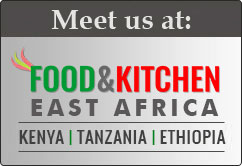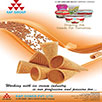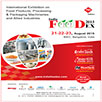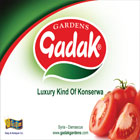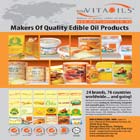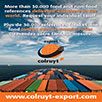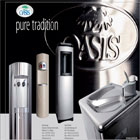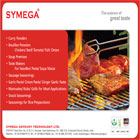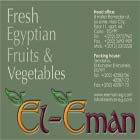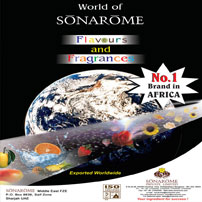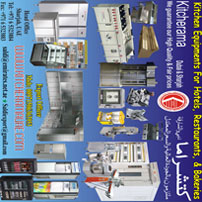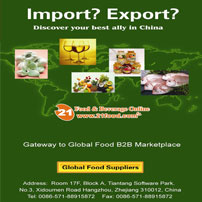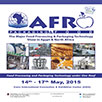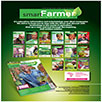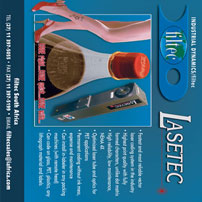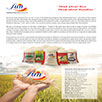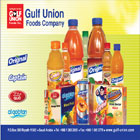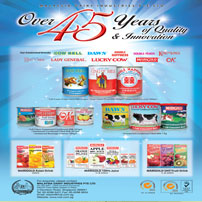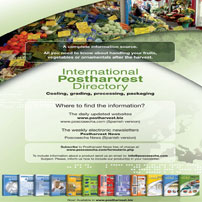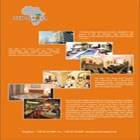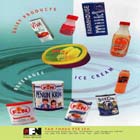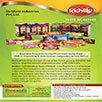

M a r k e t N e w s
Climate Smart Coffee and Banana Set to Boost East African Farmers' Income
Posted on : Thursday , 24th December 2015
Kampala — Ugandan farmers are increasingly inter-planting coffee, the country's primary export, and banana, a staple food, as a way of coping with the effects of climate change.
In densely populated Elgon and Rwenzori Mountains, the two crops have been planted together on smallholder farms despite recommendations under the colonial agricultural extension system to separate these in Central and Western Uganda where land was believed to be plentiful.
With growing population pressure and climate change, this is no longer possible. But studies by the International Institute of Tropical Agriculture (IITA) and partner organizations show that a Ugandan farmer gets 50 per cent more income from inter cropping coffee and banana than from growing either crop alone.
Conducted in over 30 districts of Uganda, the study showed that coffee yield remained the same when intercropped with bananas and the farmers gained additional income from the banana.
According to Piet Van Asten, a Systems Agronomist with IITA in Kampala, the Arabica coffee growing region around Mt. Elgon, had annual returns per hectare averaging 4,441 dollars for coffee and banana grown together, compared to 1,728 and 2,364 dollars for mono cropped banana and coffee, respectively.
In the Robusta-growing areas in South and Southwest Uganda, annual returns per intercropped hectare averaged 1,827 dollars, compared to up to 1,286 dollars for mono cropped banana and coffee.
Van Asten and other researchers at the International Center for Tropical Agriculture (CIAT) suggest inter cropping coffee and banana may also help farmers cope with climate change pressures.
With average temperatures in Uganda expected to increase by 2 degrees Celsius in the coming decades, resulting in erratic rainfall, coffee - Uganda's most important cash crop - will suffer.
Coffee generates about 20 per cent of the country's total export revenues and provides smallholder farmers with their main cash income. Both the Robusta and Arabica coffee varieties require a cool tropical climate that is found only at higher altitudes, generally above 1400 meters.
If systems are not adapted, the study findings show, areas below 1300 meters will likely become completely unsuitable for Arabica coffee production.
Those between 1300-1700 meters will be compromised for coffee if farmers do not change current practices that use traditional varieties and make limited use of water conservation and shade technologies.
Inter cropping coffee with banana provides a promising alternative. Shade from the taller banana trees can reduce temperatures for the coffee plants by 2 degrees Celsius or more. The permanent canopy, root systems, and mulch from the banana plants prevent soil erosion and degradation in Uganda's hilly landscape.
The researchers suggest that planting banana trees in coffee fields also helps to mitigate climate change by capturing carbon dioxide from the air and through the mulch, enriching the soil's carbon stocks.
Banana is an important staple and cash crop in Uganda and it is linked to food security. The country has the highest per capita banana consumption in the world. The crop is produced year round, bringing in a more modest but continual income compared to coffee, which produces once or twice a year.
For farmers, inter cropping of banana and coffee helps to diversify income, spread risks, and improve food security. Anecdotal evidence suggests that planting coffee in the shade of banana trees may improve the quality of the beans.
And coffee planted with banana has been found to have a 50 per cent lower incidence of leaf rust disease than unshaded plants, which is important as pest and disease risks are rising with increasing temperatures.
Nicholas Muhangu, an Arabica coffee farmer on slopes of the Mount Elgon in eastern Uganda told IPS that planting Arabica coffee and bananas on one piece of land offers him a double advantage. "Coffee is an important cash crop in this area. It is our gold," Muhangu said, adding: "Bananas are equally important as a food crop. It is the only food crop that thrives well in this area."
Muhangu explained that crops like maize fare poorly in his region because it is too cold and the crop takes longer to mature. "For us you cannot talk of being farmer when you don't have a garden of coffee and bananas. We have limited land so the two crops have to be farmed on the same land" he said.
Van Asten and colleagues have investigated why coffee and banana inter cropping is not more widespread in the country.
This, according to Van Asten, is because one of the disadvantages of coffee and banana inter cropping is that it increases competition for water, nutrients, and light. "But that can be managed by using good agronomic practices such as integrating fertilizers and organic nutrient inputs," he explained.
Muhangu agreed, "You only have to ensure that your bananas are properly pruned to avoid unnecessary leaves and then the two crops will co-exist comfortably. "
George Wanakina, an extension worker from Mbale District, one of Uganda's banana and coffee cultivating areas, told IPS that coffee and banana inter cropping has been part of the farmer's lifestyle and knowledge of inter cropping passed from generation to generation.
"We only need to find ways of promoting this indigenous knowledge to other parts of the country now that it is being backed by research showing it can be one of the coping mechanisms in the face of climate change," Wanakina said.
Dr George William Bazirake, a scientist at the Uganda Industrial Research Institute told IPS there is need to explore ways of avoiding nutrient mining, especially in places where bananas are farmed as a single crop.
He said inter cropping bananas would be one of the solutions to ensure soils retain some of the needed nutrients. Bazirake explained that over 40 per cent of the green banana crop is not of use to the end user in urban areas.
The scientist, who is working on a technology to vacuum seal bananas for longer shelf life, says banana peelings and coffee husks and leaves can be a climate-smart option for retaining garden soil nutrients.
An IITA trend analysis of coffee-farming systems in Eastern Uganda suggests that the ratio of inter cropping has increased over the past five years with more than 85 per cent of farmers currently maintaining at least one plot of intercropped coffee and banana.
The analysis notes that half of the coffee farmers in Central and Western Uganda still practice monoculture IITA has been researching multiple benefits of inter cropping banana and coffee in Uganda, Rwanda, Burundi and the Democratic Republic of Congo since 2006.
These benefits include: improved soil fertility through provision of mulching materials, protection of soil and coffee plants from extreme temperatures, improved quality and production of coffee, income risk management, sustainable intensification of small plots, water management, protection against erosion and run off during heavy rains.
In Uganda, this practice has not yet been officially adopted by government bodies because there are multiple actors and an unregulated field of climate change adaptation leading to slow uptake of the practice.
Recent international publications and reports however include reference to banana-coffee inter cropping as a climate-smart agricultural practice. Rwanda, for example, has had a significant shift in attitude with the government promoting the coffee, banana inter cropping.
Rwanda's National Agricultural Exports Board and the extension services have moved from a strict monoculture regulation of coffee to promotion of the benefits of inter cropping.
Source : allafrica.com


